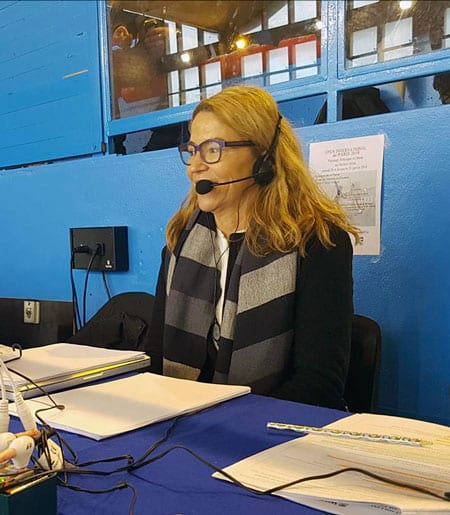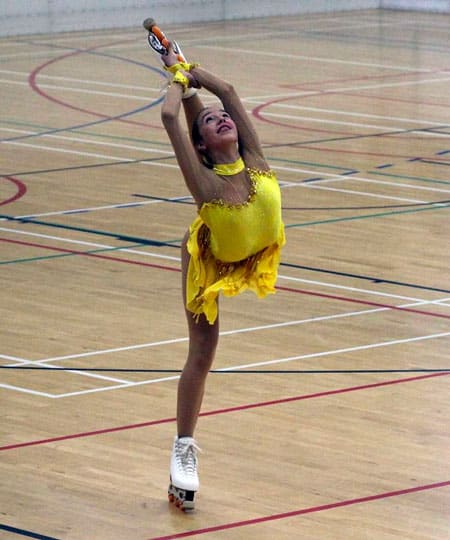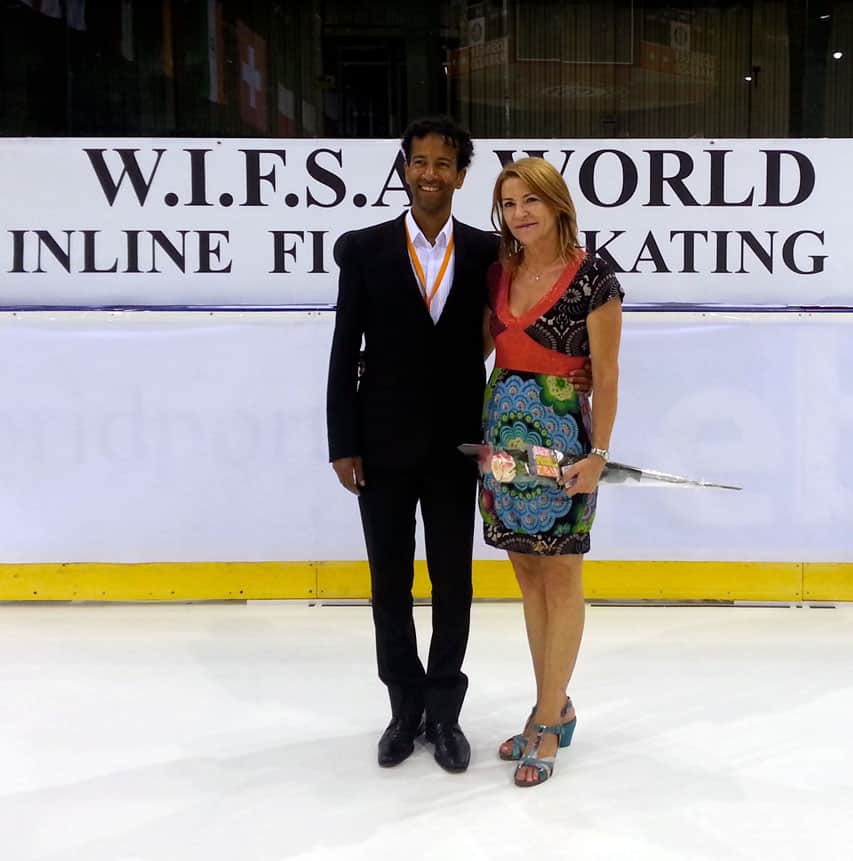Interview with Elisabet Martin Mora, vice-president of WIFSA
Elisabet Martin Mora is a former ice skating top athlete. She has now become vice-president of WIFSA (World Inline Figure Skating Organization). She tells us about her career and the evolution of the international association since its creation in 2010 ...
Interview with Elisabet Martin Mora (Barcelona, Spain)
Hello Elisabet, can you tell us about your background as a coach and member of WIFSA?
 I started Ice Skating at the age of three, I developed my sports career on the ice that culminated representing my country in various international ice competitions, obtaining USFSA Gold Medal in figures and free skating and my participation in the World Professional Figure Skating Championship in Jaca (Spain). I have been ice coach for more than 30 years and currently I am national quad coach and ice technical specialist.
I started Ice Skating at the age of three, I developed my sports career on the ice that culminated representing my country in various international ice competitions, obtaining USFSA Gold Medal in figures and free skating and my participation in the World Professional Figure Skating Championship in Jaca (Spain). I have been ice coach for more than 30 years and currently I am national quad coach and ice technical specialist.
How did you come to inline figure skating?
I came to inline more than twenty years ago, when I founded the inline skating club « Club Patinaje Benalmádena » to create a skating spirit in the city before I directed the only ice rink at that moment at Andalusia, the south of Spain. Nowadays I dedicate myself exclusively to be Inline Figure Skating head coach and quad and inline choreographer.
You are vice-president of WIFSA, what is your role exactly?
In 2010 in Paris, we cofounded WIFSA and I was voted vice-president. At that moment Jean Pierre Faugère became the first president and nowadays is WIFSA honor president.
A big part of the organization of WIFSA, which is exclusively financed by its members because it does not receive subsidies, is managed by a work team composed by president Fernand Fedronic, general secretary Reneé Piquet and me. On behalf of WIFSA, I perform tasks like having direct contact with worldwide clubs’ needs and promoting, in certain moments, the organization of international events, like 2020 Poland World Open.
How are WIFSA competitions currently judged?
Since 2013, WIFSA competitions are judged with the International Judge System, based in a big part in the ISU Judge System. This system of course has into account inline skating’s own characteristics like the bigger difficulty, in comparison to ice skating, that there is to rotate in spins.
What would you like to say to promote the discipline?
As a part of WIFSA, I think that Inline skating is a discipline that many people would enjoy. Out of all the strengths that inline has, its main one is keeping the best parts of ice and quad skating: On one hand, it has a technique, an aesthetic and a harmony very similar to ice skating. On the other hand, it shares with quad the ease of having access to an adequate sport installation for training without the need of an ice rink.
What do you think of World Skate organization, did you discuss a lasting collaboration with them? What happened?
In 2014, World Skate (back then it was called FIRS) included in its annual assembly’s agreed changes for 2015 that there would no longer be inline free skating world championship, but however the championships will be open jointly for traditional skates and inline skates together in all the disciplines (pairs, solo dance, etc.).
In October 2014, this decision was reconsidered by part of the FIRS (World Skate) Artistic Technical Committee in charge of the Inline.
In June 2015, WIFSA and FIRS made a bilateral agreement in order to work together to improve the discipline, and where Fernand Fedronic became part of the artistic technical committee. WIFSA organization was bringing its members, its technical regulations, judging system and judging officials, including, for the first time in FIRS (World Skate) a technical panel at the 2016 Novara’s World Championship.
In 2018, the chairman of World Skate Artistic Technical Committee decided to stop the collaboration with WIFSA on the basis of different point of view about the Inline management and technical regulations. And the rest is history.
What would you like to say to World Skate?
 Thanks for the opportunity. In case there was anything to say, I would not use this interview to do it.
Thanks for the opportunity. In case there was anything to say, I would not use this interview to do it.
Do you think that the discipline of quad and inline skating can be judged the same way? Can you give specific examples?
It is obvious that inline and quad cannot be judged in the same way, and neither inline with ice skating. Each modality has its own characteristics that must be respected, in order to have a healthy growth of the discipline.
Just like a motorcycle has physical differences from a car and because of that they have different ways of driving, inline and quad skating techniques in the realization of elements and way of flowing while skating are not the same.
Do you support adult skating and skaters who want to compete without being in the Elite category?
For sure. On behalf of WIFSA, I support skaters from all ages and all levels, that’s the reason because we do have four different level divisions. We bring together all kind of levels and we have a special recognition to Elite Division, which participates in World Open closure gala.
Do skaters need to pass tests to participate in WIFSA competitions?
Everyone can participate to a WIFSA event as they are all Open competitions. There is no need to pass any test to participate in WIFSA international competitions. For Silver, Recreational and Beginners’ divisions, we use a Score Table system were maximum scores are stipulated in order to belong to a determined category.
For the Elite Division the skater has to prove a minimum technical level to get into World Open. If the skater wants to participate in an Elite division’s category, previously she/he must have sent her/his punctuations protocol of any WIFSA international competition that reflects that the elements required for the Elite category are accomplished.
Why is there not yet a world championship at WIFSA?
On behalf of WIFSA, I already recognize World Open as a world championship. The nomenclature does not make the competition, but the volume, quality of the competition, quantity of countries that take part of the event. There is a clear annual growth in the participation, and it is really nice that skaters can participate in many official modalities like free skating, pairs, solo dance, pairs dance, quartet, chorus and synchronized. It is clear that during competitions, we enjoy an amazing fraternal atmosphere.
What do you hope to see as an evolution for our sport?
I would like inline skating to continue having a very close relationship with ice skating development, technique and international projection, with an absolute specialization in inline judging panels, as WIFSA does, and with a necessary camaraderie with quad discipline that is essential for a successful and healthy development of our modality.

Do you have an idea of the number of WIFSA members compared to World Skate members?
 There are no World Skate individual members because this body only identifies national federations. Nevertheless WIFSA, in addition to national federations, identifies as members the clubs, its directives and skaters. In last WIFSA World Open in Fasano (Italy), we did have 380 skaters (who at the same time are members).
There are no World Skate individual members because this body only identifies national federations. Nevertheless WIFSA, in addition to national federations, identifies as members the clubs, its directives and skaters. In last WIFSA World Open in Fasano (Italy), we did have 380 skaters (who at the same time are members).
Who can be eligible to become an inline artistic coach?
Nowadays, what WIFSA valuates in order to have a title is the development that is being done with students, the professional experience and results. We do validate determined ice skating degrees and titles because we understand that there exists a very important similarity between these two modalities.
Do you know how many countries participate in WIFSA competitions?
During its existence, we have hosted 18 countries in the association. In last Fasano WO, 15 countries participated and the judging panel was composed by judges by Canada, France, Iran, Ireland, Italy, Poland, Rumania and Russia.
New inline skaters do not know which organization to turn to (WIFSA or World Skate). Do you have any advice for them?
Inline skaters cannot turn individually to World Skate, because this body only recognizes national federations. Only WIFSA guaranties a specific service dedicated to Inline skaters, promoting the discipline at any level, age and country.
Do you want to add something?
I thank you for the interview. I invite readers and fans of the modality to visit our page www.wifsa.net and contact us if they have any question or suggestion.

